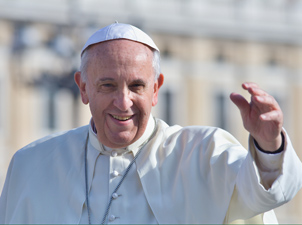
As Pope and President Meet, A Call for Interconnectedness
Mary J. Novak
October 28, 2021
Existential threats to the environment, a global refugee crisis, anti-democratic movements at home and abroad, and the COVID-19 pandemic are among the challenges surrounding President Joe Biden’s meeting with Pope Francis on Oct. 29. As collaboration between these two world leaders takes shape, a key to its success will be their both recognizing and then acting upon the interconnectedness of everything that confronts them.
This ability to see interconnection is constitutive to the spirituality of the Catholic sisters whose legacy lives on in the U.S. Church and at NETWORK in particular where it is my honor to continue that legacy. And it is not difficult to see this ability lived out by the pope and the president themselves. Both men are of the same generation. Both came into leadership positions in their 30s, have weathered periods of darkness and were entrusted with power late in life. They share the opportunity to use that power to guide the world toward a much brighter future than is currently being offered and both feel called by God to this role at this time.
Their meeting will be the 31st of its kind, starting with the 1919 meeting of Woodrow Wilson and Benedict XV. But to connect this week’s meeting with a comparable example of a pope and president meeting amidst great upheaval and positioned to build the future anew, we should look to the October 1965 meeting in New York between Paul VI and Lyndon Johnson.
Two months before that meeting, President Johnson signed the Voting Rights Act, offering legal protection to millions of people whose rights were violated by racist laws. The ground lost on this issue in recent years would have once been unthinkable to many well-intentioned white people. But now, as that ugly truth confronts us, we urgently need to protect the right to vote under federal policy with the John Lewis Voting Rights Act.
Two months after the New York meeting, Pope Paul closed the Second Vatican Council and instituted the Synod of Bishops, setting a trajectory of engagement with the world and encounter with people at the peripheries. Communities of women religious were among the most robust adopters of the council’s vision, and Pope Francis ardently pursues it for the whole church to this day.
Biden, himself a proponent of that vision and an ally to women religious, has proposed a formidable economic agenda, reminiscent of LBJ, which seeks to help people where they are, in their everyday struggles. These struggles are worsened by the egregious income and wealth disparity in this country, a fact the Catholic Church rightly condemns. In 1965, the U.S. sought to go to the moon in a shared spirit of scientific exploration. Today billionaires have begun traveling to outer space for fun.
The last time Francis and Biden spent significant time together was the pope’s 2015 visit to the United States, where Francis challenged our country to live up to our own ideals. The same year, Francis published his letter on care for the environment, “Laudato si,” again highlighting the interconnection of all creation. A lot has happened since then, and at times the pope seems to grasp the threats we face more acutely than our own elected officials do.
Shortly before the election of Donald Trump, Francis spoke against building walls and the manipulation of fear, which he said “anaesthetizes us to the sufferings of others, and in the end makes us cruel.” He later noted that those who manipulate fear reject the interconnection of all people and shift blame onto a “non-neighbor.”
These words proved prophetic in heralding the racist immigration policies of the Trump administration. They also highlight why it’s so unacceptable for the Biden administration to have continued Title 42 and other policies that make life even more difficult for people seeking refuge in our country. Disapproval for the president’s handling of immigration is now at 58 percent (Grinnell College National Poll), and it is senseless to allow these cruel policies to jeopardize his entire agenda.
If our Catholic president wants to be a world leader in keeping with the vision of Pope Francis, he should follow the lead of women religious and enact policies that better recognize the interconnected nature of all people, all creation, and the common good. He must ensure the protection of the people most targeted by the anti-democratic forces he denounces. I pray Pope Francis can provide him the spiritual strength and fraternal correction he needs to act on the interconnectedness that we know he sees, making it real for the millions of folks who have been left behind for so long.







